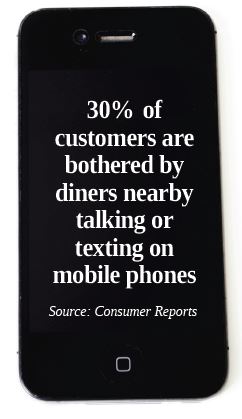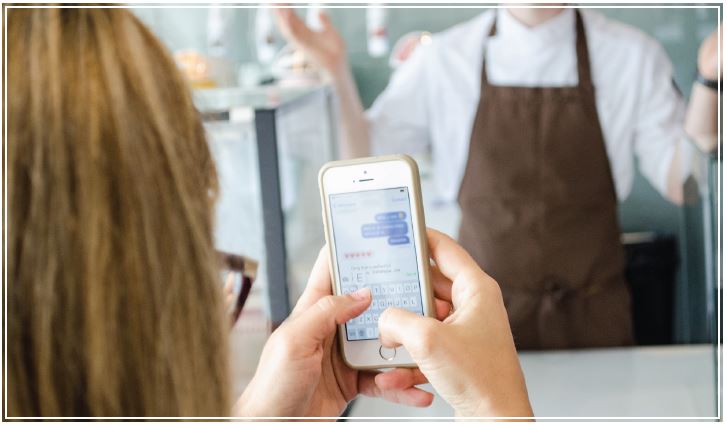I wonder how long it’s going to be before someone asks if I need help [as the server plays away on their smartphone],” is an aggravating thought that almost every consumer has experienced at one point or another. And, unfortunately, as a result the potential buyer is more than likely to refrain from revisiting that business again or worse, resort to negative word-of-mouth publicity. Superb workplace etiquette is of utter importance when the consumer is paying for prompt and efficient service. Ensuring your team members are positively interacting with customers and not navigating the worlds of smartphones and social media is a best business practice. It’s also important to monitor the behavior of customers who patronize your business to make sure they aren’t creating problems by also tuning into phones as well [think Skype calls without headphones and talking on the phone while ordering]. Yes, these all seem like no brainer standards for a restaurant or café, but good service and courtesy to those around is fading fast thanks to America’s love affair with technology, and it’s up to each and every business to uphold and promote good etiquette in the workplace.
Manufacturing Great
Customer Service
Have you ever seen a movie that depicts early- to mid-20th Century? The kind of cinematic experience that showcases the fantastic differences between the past and present from language and fashion to social interaction including customer service. For instance, in part one of the 1980s classic movie series “Back to the Future,” the lead character Marty McFly accidentally travels from 1985 to 1955 – a 30-year difference. During his many adventures, the fascinated teenager witnesses numerous examples of great customer service including a gas station attendant dressed in full uniform that cheerfully pumps gas, checks the engine oil and washes the windshield of his customer’s vehicle with a smile. A soda jerk at the local hangout also makes fanciful milkshakes and floats to order in record time. Each professional in the movie showcases attention to detail, showmanship and genuine interest in their jobs. It’s imperative that employees in serving positions understand proper customer courtesy. And regarding the use of electronic communication in the workplace, Kelly Services, suggests some basic rules for employees including:
- Setting phones to vibrate
- Letting unimportant calls go to voicemail
- Finding a private place to make personal calls if it’s absolutely necessary
 According to “Cell Phone Policy for Restaurants,” published on ehow.com, electronic communication in the dining industry can slow down prep time for cooks and is a breach of etiquette if utilized by serving staff while on the floor. To help prevent low productivity and overall customer dissatisfaction, it’s important that companies introduce cell phone policies in the workplace to help eliminate possible abuse. Keep in mind that these policies should be catered to the individual establishment. For example, a higher-end restaurant may consider on-site cell phone use as grounds for termination, while a more relaxed establishment would default to disciplinary actions. Considering the grand necessity cell phones have become, it is not recommended to ban the electronic devices. Taking a no cellular policy can severely reduce morale especially for parents and caretakers who rely heavily on their devices to monitor outside responsibilities.
According to “Cell Phone Policy for Restaurants,” published on ehow.com, electronic communication in the dining industry can slow down prep time for cooks and is a breach of etiquette if utilized by serving staff while on the floor. To help prevent low productivity and overall customer dissatisfaction, it’s important that companies introduce cell phone policies in the workplace to help eliminate possible abuse. Keep in mind that these policies should be catered to the individual establishment. For example, a higher-end restaurant may consider on-site cell phone use as grounds for termination, while a more relaxed establishment would default to disciplinary actions. Considering the grand necessity cell phones have become, it is not recommended to ban the electronic devices. Taking a no cellular policy can severely reduce morale especially for parents and caretakers who rely heavily on their devices to monitor outside responsibilities.
Companies also need to ensure that policies be enforced across the board – this is includes management as well. When policy administration does not affect all levels of hierarchy, employees can negatively view management, find the treatment unfair and respect for leadership decreases.
Oftentimes staff are not the only users who affect business by way of cell phone abuse, and policies also have to be put in place for consumers to follow.
Monitoring Your Environment
Cell phones are a hot commodity in today’s society. Patron smartphone use can hold up lines, produce loud conversations as well as ringtones and alert noises, and overall make others in surrounding areas uncomfortable. Businesses should have a plan for handling excessive use by patrons, especially when it is disrupting the flow of business and other visitors to ensure a pleasurable experience for everyone.
According to an article posted on swipely.com “Are Aggressive No-Cellphone Policies at Restaurants Good for Business,” some preventative procedures include offering discounts for customers willing to surrender their cell phones upon entry; posting signs requesting patrons to refrain from use; making diners sign a no-cell phone contract before making reservations, and in another example, billing a surcharge fee for using their cell phones while visiting an eating establishment. These methods promote a more conducive environment for all parties, including staff and other patrons.
Generally, with phone and social media use at an all-time high, navigating the waters with staff and patrons is a careful maneuver with the standards changing every day. The important note is to start with one and amend where necessary.
When it comes to phenomenal customer service, the words of the late American poet Maya Angelou are worth committing to memory and practice: people will forget what you said, people will forget what you did, but people
will never forget how you made
them feel.

